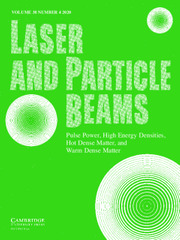Crossref Citations
This article has been cited by the following publications. This list is generated based on data provided by Crossref.
Melzer, Andrea
Kampa, Daniel
Wang, Jinxiong
and
Fauster, Thomas
2009.
Time-resolved photoemission at the Si(100)-Ga surface using a femtosecond higher-harmonic laser source.
Physical Review B,
Vol. 80,
Issue. 20,
KBASHI, HANI JASSIM
JAWAD, HUSSEIN
AL-NAIMEE, KAIS A.
BENOCCI, ROBERTO
CARPEGGIANI, PAOLO
PEREGO, CLAUDIO
and
BATANI, DIMITRI
2009.
SPECTRAL WIDTH VARIATION OF ULTRASHORT LASER PULSES IN MONOMODE OPTICAL FIBERS.
Journal of Nonlinear Optical Physics & Materials,
Vol. 18,
Issue. 03,
p.
541.
Malav, Harish
Maheshwari, K. P.
and
Choyal, Y.
2011.
Analytical and numerical investigation of pulse-shape effect on the interaction of an ultrashort, intense, few-cycle laser pulse with a thin plasma layer.
Laser and Particle Beams,
Vol. 29,
Issue. 1,
p.
45.
Malav, Harish
Maheshwari, K.P.
and
Choyal, Y.
2012.
Analytical and numerical investigation of the pulse-shape effect on the longitudinal electric field of a tightly focused ultrafast few-cycle TM01 laser beam.
Laser and Particle Beams,
Vol. 30,
Issue. 1,
p.
75.

